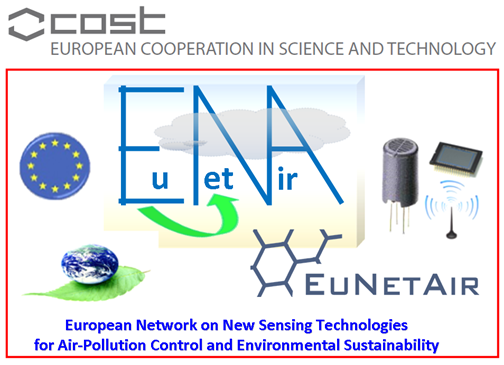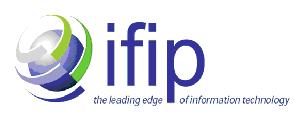3rd Intelligent Systems for Quality of Life information Services Workshop (ISQL 2012)
Important Dates:
Paper submission: May 15, 2012
Notification of acceptance/rejection: May 25, 2012
Camera-ready submission: June 5, 2012
Early registration: June 04, 2012 June 25th, 2012
Workshop dates: To be announced
Workshop Chair
Kostas Karatzas
Aristotle University of Thessaloniki, Greece
kkara@eng.auth.gr
Workshop Vice-Chairs
Lazaros Iliadis
Democritus University of Thrace, Greece
liliadis@fmenr.duth.gr
Mihaela Oprea
University Petroleum-Gas of Ploiesti, Romania
m_oprea@yahoo.com
Workshop Program Committee
- Dubravko Culibrk, University of Novi Sad, Serbia
- Deborah Estrin, UCLA, USA
- Ellie D'Hondt, Vrije Universiteit Brussel, Belgium
- Mikko Kolemainen, University of Eastern Finland, Finland
- Ville Kotovirta, VTT, Finland
- Jaakko Kukkonen, Finnish Meteorological Institute, Finland
- John Lee, University of Edinburgh, UK
- Eros Pasero, Politecnico di Torino, Italy
- Elias Pimenidis, University of East London, UK
- Michele Penza, ENEA, Italy
- Leandros Tassiulas, University of Thessaly, Greece
- Leo Wanner, Universitat Pompeu Fabra, Spain
Workshop Aim: Quality of Life (QoL) is directly related to environmental pressures and conditions, including air quality, pollen, drinking and bathing water quality, noise pollution, waste production, energy consumption, nutrition and many others.
Intelligent systems collect data about the environment’s status and quality, at the individual user and business level, through the use of participatory environmental sensing and available ICT and web 2.X technologies. Computational intelligence methods are particularly suitable for environmental modeling, knowledge extraction and generation of knowledge intensive e-services content, thus being necessary for the development of QoL information services.
On the other hand, the developments in ICT make environmental data & services ubiquitous. The plethora of patterns of everyday life, as well as the availability of various ICT that are interwoven to the urban web, lead to intelligent, personalized and yet easily generalized ways for monitoring, modeling and managing environmental systems and conditions.
It is therefore evident that services, systems, applications and algorithms dealing with everyday utility for the individual, are expected to play an important role in supporting QoL. On this basis, QoL environmental information services are expected to make use of personalized access and interactivity to multimodal information, based on user preferences and semantic concepts or human-machine interface systems utilizing information on the affective state of the user.
The proposed workshop will address intelligent methods for analyzing and modeling environmental systems and conditions, with the aim to serve the everyday needs of citizens under various QoL states. Human centric approaches in environmental information services will also be addressed, as they require intelligent, knowledge-centric methods and tools, that are flexible, adaptable to environmental problems, and perform better in terms of knowledge mapping and system behavior reproduction.
Issues to be addressed include (indicative list):
- Participatory sensing
- Environmental Sensors
- Hybrid and Multi Agent Systems in environmental monitoring
- Orchestrated systems and services
- Environmental modeling for Service provision
- Internet of things and environmental sensing
- Mobile device applications
Submission:
All papers should be submitted to both Program chairs: liliadis@fmenr.duth.gr and kkara@eng.auth.gr. Papers should be submitted either in a doc or in a pdf form and they will be peer reviewed by at least 2 academic referees. They should not exceed 10 pages formatted according to the LNCS Springer style (guidelines link).
Publication:
Accepted papers will be presented orally in the conference for 20 minutes and they will be published in the Springer LNCS Proceedings of the main event.
They will be also considered for potential selection for publication in the Special Issues that will be edited.
Registration fees and benefits for the workshops' participants are exactly identical with the ones of the main AIAI 2012 event.
COST Tutorial

The Tutorial aims to provide to the scientific community of Computational intelligence and Quality of Life Information Services, as well as to anyone else interested, with information on the current state of play in new sensor technologies and new sensing concepts. The tutorial will be based on research results achieved by members of the COST Action TD1105 EuNetAir and is part of the Action's efforts for dissemination of results and for cross-domain scientific collaborations.
Current trend in the solid-state sensing technology is the development of nanomaterials and nanostructures with novel functionalities and innovative properties at the nanoscale for high-performance chemical sensing. In this direction, great efforts in the ongoing research have been doing to fabricate environmental sensors with advanced sensing nanostructures and high-resolution transducers coupled to proper electronic interfaces and new algorithms of pattern recognition and signal processing.
The key role for high-performance environmental sensors and sensor-systems is the engineering of sensing devices, ICT hardware, ad-hoc software/firmware, emerging transducers and sub-systems to develop air quality control applications with ubiquitous and mobile sensor-systems, including participating sensing and wireless sensor networks. This Tutorial will be completely devoted to Environmental Sensors for Air Quality Control Applications.
This event is based on Tutorial Session focussing environmental hot-issues from at least 3 Speakers from COST Action TD1105 EuNetAir and an Overview of the COST Action TD1105 from Chair (or a MC Delegate) towards large and specialized target audience with high benefit for COST Action TD1105.
COST: Invited Speakers
- Tutorial title: Overview of COST Action TD1105 EuNetAir
Speaker: Dr. Michele Penza, ENEA, Action Chair, IT - Tutorial title: New approaches in outdoor air quality monitoring: mobile sensing, participatory sensing and sensor networks
Speaker: Dr. Jan Theunis, VITO, BE - Tutorial title: Applications of sensors for urban air quality monitoring
Speaker: Dr. Christoph Hueglin, EMPA, CH - Tutorial title: Standards for AQC Sensors, creating a more Healthy Environment
Speaker: Prof. Ingrid Bryntse, SenseAir AB, SE
COST: Session Chairs
- Michele Penza, ENEA - Italian National Agency for New Technologies, Energy, and Sustainable Economic Development, Technical Unit of Technologies for Materials Brindisi, Italy; michele.penza@enea.it
- Kostas Karatzas, Aristotle University of Thessaloniki, Greece; kkara@eng.auth.gr
COST: Call for papers
This Tutorial openly calls for perspective and original contributions in the field of environmental sensors, sensor-systems, sensor technology and applications, from science and technology worldwide community, over COST Action and move towards new interested researchers and stakeholders working in the field of Action core-themes. These contributions related to Action-issues from extra-Action scientists would be submitted free of charge to the new open-access Journal of Sensors and Sensor Systems (JSSS) (www.journal-of-sensors-and-sensor-systems.net). The regular issue JSSS accepts contributions to cover a full range of sensors and sensor-systems such as theory, basic properties, design, fabrication, processing, calibration, measurements, integration, characterization, applications. We invite the submission of the manuscripts related to the fundamental and applied aspects for the environmental sensory, sensors science, gas sensors, air quality control sensor-systems applications, measuring systems, sensor technologies, environmental smart systems, sensing solutions, environmental ICT applications, mobile sensing, participatory environmental sensing, etc.
Topics of interest include, but not limited to:
- environmental sensors
- outdoor/indoor air quality monitoring
- mobile sensing
- participatory sensing
- sensor networks
- gas sensors
- sensor arrays
- pattern recognition and signal processing
- modelling of sensors
- electronic interfaces for sensors
- applications of sensor systems
Authors should follow the Journal of Sensors and Sensor Systems (JSSS) manuscript format described at the open-access journal site www.journal-of-sensors-and-sensor-systems.net. Prospective authors should submit an electronic copy of their complete manuscript. Papers should be submitted either in a doc or in a pdf form and they will be peer reviewed by at least 2 academic referees. Notice of submission from authors should be emailed to Tutorial Session Chairs.


